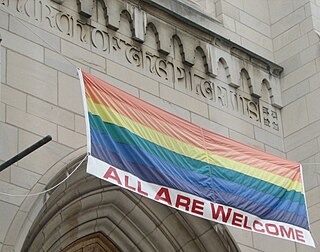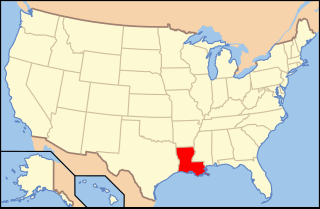Same-sex marriage is legal in all parts of the United Kingdom. As marriage is a devolved legislative matter, different parts of the UK legalised at different times; it has been recognised and performed in England and Wales since March 2014, in Scotland since December 2014, and in Northern Ireland since January 2020. Civil partnerships, which offer most, but not all, of the rights and benefits of marriage, have been recognised since 2005.

The Christian Institute (CI) is a charity operating in the United Kingdom, promoting a Christian viewpoint, founded on a belief in Biblical inerrancy. The CI is a registered charity. The group does not report numbers of staff, volunteers or members with only the Director, Colin Hart, listed as a representative. However, according to the accounts and trustees annual report for the financial year ending 2017, the average head count of employees during the year was 48 (2016:46).

Gay-friendly or LGBT-friendly places, policies, people, or institutions are those that are open and welcoming to gay or LGBT people. They typically aim to create an environment that is supportive, respectful, and non-judgmental towards the LGBT community. The term "gay-friendly" originated in the late 20th century in North America, as a byproduct of a gradual implementation of gay rights, greater acceptance of LGBT people in society, and the recognition of LGBT people as a distinct consumer group for businesses.

Attitudes in Ireland towards lesbian, gay, bisexual, and transgender (LGBT) people are among the most liberal in the world. Ireland is notable for its transformation from a country holding overwhelmingly conservative attitudes toward LGBT issues, in part due to the opposition by the Roman Catholic Church, to one holding overwhelmingly liberal views in the space of a generation. In May 2015, Ireland became the first country to legalise same-sex marriage on a national level by popular vote. The New York Times declared that the result put Ireland at the "vanguard of social change". Since July 2015, transgender people in Ireland can self-declare their gender for the purpose of updating passports, driving licences, obtaining new birth certificates, and getting married. Both male and female same-sex sexual activity have been legal in the state since 1993. Government recognition of LGBT rights in Ireland has expanded greatly over the past two decades. Homosexuality was decriminalised in 1993, and most forms of discrimination based on sexual orientation are now outlawed. Ireland also forbids incitement to hatred based on sexual orientation.

Canadian lesbian, gay, bisexual, and transgender (LGBT) rights are some of the most extensive in the world. Same-sex sexual activity was made lawful in Canada on June 27, 1969, when the Criminal Law Amendment Act, 1968–69 was brought into force upon royal assent. In a landmark decision in 1995, Egan v Canada, the Supreme Court of Canada held that sexual orientation is constitutionally protected under the equality clause of the Canadian Charter of Rights and Freedoms. In 2005, Canada was the fourth country in the world, and the first in the Americas, to legalize same-sex marriage nationwide.

National Coalition for Gay and Lesbian Equality and Another v Minister of Justice and Others is a decision of the Constitutional Court of South Africa which struck down the laws prohibiting consensual sexual activities between men. Basing its decision on the Bill of Rights in the Constitution – and in particular its explicit prohibition of discrimination based on sexual orientation – the court unanimously ruled that the crime of sodomy, as well as various other related provisions of the criminal law, were unconstitutional and therefore invalid.

Lesbian, gay, bisexual, transgender (LGBT) rights in Northern Ireland have traditionally been slower to advance than the rest of the United Kingdom, with the region having lagged behind England, Scotland, and Wales. Northern Ireland was the last part of the United Kingdom where same-sex sexual activity was decriminalised, the last to implement a blood donation “monogamous no waiting period” policy system for men who have sex with men and, after intervention by the Parliament of the United Kingdom, the last to allow same-sex marriage. Compared to the neighbouring Republic of Ireland, all major LGBT rights milestones had been reached earlier in Northern Ireland, with the exception of same-sex marriage. Homosexuality was decriminalised in Northern Ireland a decade earlier and civil partnerships were introduced six years earlier.
Same-sex marriage has been legal in Northern Ireland since 13 January 2020, following the enactment of the Northern Ireland Act 2019. The first marriage ceremony took place on 11 February 2020. Civil partnerships have also been available for same-sex couples in Northern Ireland since their introduction by the Government of the United Kingdom in 2005.

Forum for Equality is a Louisiana-based statewide LGBT civil rights advocacy group that was founded in 1989. The major focus of this group is on the political process, in which it encourages members to participate through reminders of upcoming elections, campaigns promoting awareness of legislation that affects the LGBT community, and rallies to demonstrate popular support for LGBT civil rights. The group also works to educate the LGBT community in Louisiana about the issues that affect the community as a whole. The organization is a member of the Equality Federation.
This is a list of events in 2011 that affected LGBT rights.
This is a timeline of notable events in the history of lesbian, gay, bisexual and transgender people in South Africa.
Klein, dba Sweet Cakes by Melissa, v. Oregon Bureau of Labor and Industries was a legal case against a cake shop in Gresham, Oregon, in the United States. The cake shop gained widespread press attention in January 2013 when it turned away customers who wanted cakes for a same-sex wedding, who then made a complaint to the Oregon Bureau of Labor and Industries, claiming their civil rights under the Oregon Equality Act had been infringed.
Masterpiece Cakeshop v. Colorado Civil Rights Commission, 584 U.S. ___ (2018), was a case in the Supreme Court of the United States that dealt with whether owners of public accommodations can refuse certain services based on the First Amendment claims of free speech and free exercise of religion, and therefore be granted an exemption from laws ensuring non-discrimination in public accommodations—in particular, by refusing to provide creative services, such as making a custom wedding cake for the marriage of a gay couple, on the basis of the owner's religious beliefs.
Compelled speech is a transmission of expression required by law. A related legal concept is protected speech. Just as freedom of speech protects free expression, in many cases it similarly protects an individual from being required to utter or otherwise express a thought with which that individual disagrees.
Events during the year 2018 in Northern Ireland.
This is a list of notable events in LGBT rights that took place in the 2010s.
Same-sex unions are currently not performed in Namibia. However, since a Supreme Court judgment in May 2023, same-sex marriages concluded outside Namibia are recognised equally.
Forstater v Centre for Global Development Europe is a UK employment and discrimination case brought by Maya Forstater against the Center for Global Development (CGD). The Employment Appeal Tribunal decided that gender-critical views are capable of being protected as a belief under the Equality Act 2010. The tribunal further clarified that this finding does not mean that people with gender-critical beliefs can express them in a manner that discriminates against trans people.
303 Creative LLC v. Elenis, 600 U.S. ___ (2023), is a United States Supreme Court decision that dealt with the intersection of anti-discrimination law in public accommodations with the Free Speech Clause of the First Amendment to the United States Constitution. In a 6–3 decision, the Court found for a website designer, ruling that the state of Colorado cannot compel the designer to create work that violates her values. The case follows from Masterpiece Cakeshop v. Colorado Civil Rights Commission, 584 U.S. ___ (2018), which had dealt with similar conflict between free speech rights and Colorado's anti-discrimination laws, but was decided on narrower grounds.







